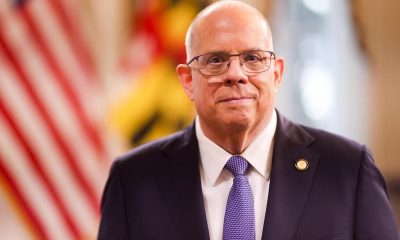Local
Maryland House passes trans bill
Protection act has supporters in the Senate; measure passed by wide margin
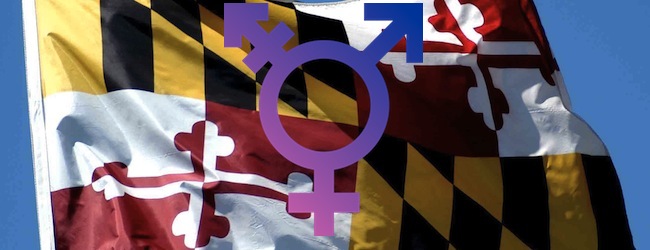
The Maryland House of Delegates voted 86-52 on Saturday to pass legislation that would ban discrimination against transgender Marylanders in the area of employment, housing and credit.
The vote came after a 50-minute debate in which delegates supporting the Gender Identity Anti-Discrimination Act urged their colleagues to help end what they called an injustice against fellow citizens whom they said have been denied jobs and housing solely because of their gender identity.
“This is a huge demonstration in support of fairness today,” said Morgan Meneses-Sheets, executive director of Equality Maryland, the state LGBT group that led lobbying efforts to pass the bill.
“We still have work to do,” she said. “We’ve got to get it through the Senate. But we are overjoyed with the outcome today.”
Meneses-Sheets and other advocates for the bill said they were hopeful the measure would clear the Senate Judicial Proceedings Committee in the next week and receive a favorable vote in the full Senate.
The Maryland Legislature adjourns for the year on April 11, and all legislation must clear both houses before then.
Saturday’s vote in favor of the gender identity bill in the 141-member House fell largely along party lines. Eighty-five Democrats and just one Republican voted for the bill. Forty Republicans and 12 Democrats voted against it. Three delegates — two Republicans and one Democrat — were absent and did not vote.
The House’s approval of the gender identity bill by a sold 34-vote margin appears to indicate that transgender rights, while controversial, hasn’t elicited the intensity of opposition that surfaced over a Maryland same-sex marriage bill.
A bill calling for legalizing civil marriage for same-sex couples died in the House of Delegates two weeks ago when Democratic leaders withdrew the bill from the floor after determining they did not have the votes to pass it. The Maryland Senate passed the bill by a vote of 25-21 on Feb. 25.
Some activists feared that the heated controversy over the decision to withdraw the marriage bill before a vote might make delegates less likely to support any LGBT-related bill, including a transgender rights bill.
A number of House Democrats who wavered over or announced plans to drop their support of the marriage bill voted for the gender identity bill on Saturday. Among them were Dels. Sam Arora (D-Montgomery County), Tiffany Alston (D-Prince George’s County) and Jill Carter (D-Baltimore City).
During Saturday’s floor debate over the gender identity bill, opponents, including Del. Joseph Minnick (D-Baltimore County) and Del. Richard Impallaria (R-Baltimore and Harford Counties) raised concerns that the bill would enable men who “cross dress” as women to create disturbances in the workplace or threaten women in public or workplace bathrooms.
“Every woman should be appalled by this legislation,” said Minnick, who told of once encountering a male-to-female transgender person in a public men’s bathroom at the state capital in the 1990s.
“That left a lasting impression on me,” he said. “The way that person was dressed [he] could have very easily gone into the lady’s room and used the lady’s facility. Now I don’t think that’s what you want with this kind of legislation.”
A few of the delegates opposing the bill pointed to the 1970s television program M.A.S.H., which included a character named Maxwell Klinger. They noted the Klinger character dressed in female clothes at a U.S. Army installation in Korea during the Korean War as a ploy to obtain a “Section 8” psychiatric discharge from the military.
Minnick said the gender identity bill could hurt businesses by allowing cross dressing “scammers” like the Klinger character to create problems at the workplace and file a lawsuit if the employer sought to fire the person.
Del. Dan Morhaim (D-Baltimore County), who served as floor leader for the bill, disputed claims that it would impact public bathrooms, saying the legislation did not include a public accommodations provision and would make no changes in the availability of public bathrooms to transgender people.
When asked by opponents whether transgender employees protected under the bill’s employment non-discrimination provision would have access to workplace bathrooms, Morhaim said that would be left to the discretion of an employer.
Del. Kirill Reznick (D-Montgomery County), a supporter of the bill, said that while public bathrooms were not covered in the Gender Identity Non-Discrimination Act, transgender non-discrimination laws that do include public accommodations protections have not created problems — either related to bathrooms or at the workplace.
“The reality is 12 states have passed broader protections that this bill,” he said. “A hundred and thirty-four jurisdictions — counties and cities across this country — have boarder protections than this bill. And we have not heard of one instance where businesses have had to build a third bathroom, where children or women have been attacked and these protections were used as a defense — not one case in 10 years,” he said.
Del. Joseline Pena-Melnyk (D-Prince George’s and Anne Arundel Counties), the author and lead sponsor of the bill, expressed dismay over what she called “unfounded” assertions that transgender people cause problems at the workplace or in bathrooms.
“In the last few minutes I have heard some things that are truly sad,” she said. “The reason why we need this bill is because of what you heard today. People have preconceived ideas and prejudices.”
Pena-Melnyk said she was troubled that opponents were basing much of their opposition on perceived problems that could not result from the bill, in part, because she removed a public accommodations provision to expand the support needed to pass the bill.
“And I did so because the political reality is that I could not have gotten the bill out — look at the discussion today — if I had public accommodations in it,” she said. “But it gives you protections.”
Del. Maggie McIntosh (D-Baltimore City), one of seven openly lesbian or gay members of the House of Delegates, noted that transgender protections were omitted entirely from a Maryland law banning discrimination based on sexual orientation that the legislature passed 10 years ago.
“It was a calculated decision and one that I frankly regret,” she said, referring to the omission of a transgender provision. “I think it was the wrong decision. And this bill today, House Bill 235, rights a very bad wrong that we need to do,” she said. “And I ask you to support House Bill 235, a very important step forward to end discrimination in Maryland.”
Transgender rights advocate Dana Beyer, who ran for a seat in the House of Delegates last year, called approval of the bill by the House historic.
“We still have two more votes to go to get this bill done and then we need to work on adding public accommodations next year,” she said. “Actually, the only statement from the opponents with which I agree was, you know, if you give them this now they will come back and say they want full civil rights. And, yeah, that’s the case. We want full civil rights, and we’ll get them one step at a time.”
Maryland
Silver Spring holds annual Pride In The Plaza
‘Today means inclusion. It means to build resilience’

Silver Spring’s annual Pride in the Plaza event took place on Sunday to celebrate the LGBTQ community and emphasize inclusion and resilience.
“Today means inclusion. It means to build resilience, love,” Robyn Woods, program and outreach director for Live In Your Truth, which organized the event, said. “I mean, just being surrounded by the community and so many great entrepreneurs, business owners, and just being a part of this whole rainbow coalition that we call the LGBTQIA to be about.”
With the event being her first time organizing for Live In Your Truth, Woods said she felt emotional to see the support and love at the event.
“Some people (are) bringing out their children, their babies, their grandparents,” Woods said. “It’s a lot more allies here than anything else. That type of support to me means so much more than just support from my community; just outside support, inside support, so much support around it, so much love. Everyone’s smiling outside, helping each other.”
Attendees of the event were able to head over to the Family Fun Zone, an air-conditioned Pride Cool Down Lounge, or watch live drag performances in the main stage area.
Along with entertainment and a shaved-ice stand, rows of information tables stood along the plaza, including FreeState Justice, the Washington Spirit, Trans Maryland, Moco Pride Center, and the Heartwood Program, an organization that offers support, therapy, education, and resources to the LGBTQ community.
“I want people to know about our services, and I love what we have to offer,” Jessica Simon, psychotherapist for Heartwood Program’s Gender Wellness Clinic, said. “I (also) want to be part of a celebration with the community, and so it feels good to be here with other people who have something they want to give to the community.”
She added that within today’s political climate, to which she called an “antidote to shame,” it’s important to be celebrating Pride.
“There’s a lot of demonization of LGBTQI people,” Siena Iacuvazzi, facilitator for Maryland Trans Unity, said. “(Pride) is part of the healing process.”
Iacuvazzi said she was taught to be ashamed of who she was growing up, but being a part of a community helped her flourish in the future.
“I was taught how to hate myself. I was taught that I was an abomination to God,” she said. “But being a community is like understanding that there are people who have experienced the same thing, and they’re flourishing. They’re flourishing because they’re willing to stand up for themselves as human beings and discover themselves and understand what’s true for themselves.”
She added that Pride allows for a mutual understanding to take place.
“It’s more of a sense of belonging … and just taking that home and understanding you’re not alone,” Iacuvazzi said. “We’re each taking our own journey — we’re not putting that on each other. It’s just walking away with a sense of belonging and humanity.”
Similar to Iacuvazzi, Woods said she hopes attendees’ biggest takeaways would be family, fun, resilience, and pride.
“Being proud of yourself, being happy for who you are, and representation and how much it matters,” she continued. “And I think all these young people that are walking around here get to see versions of themselves, but older. They get to see so many different lesbian, gay, bisexual, pansexual people that are successful, that are showing love, that care, and it’s not how we’re portrayed in the media. It’s lovely to see it out here. (It’s) like we’re one big old, happy family.”
Virginia
Spanberger touts equality, reproductive rights in Arlington
Democratic Va. gubernatorial nominee made campaign stop at Freddie’s Beach Bar
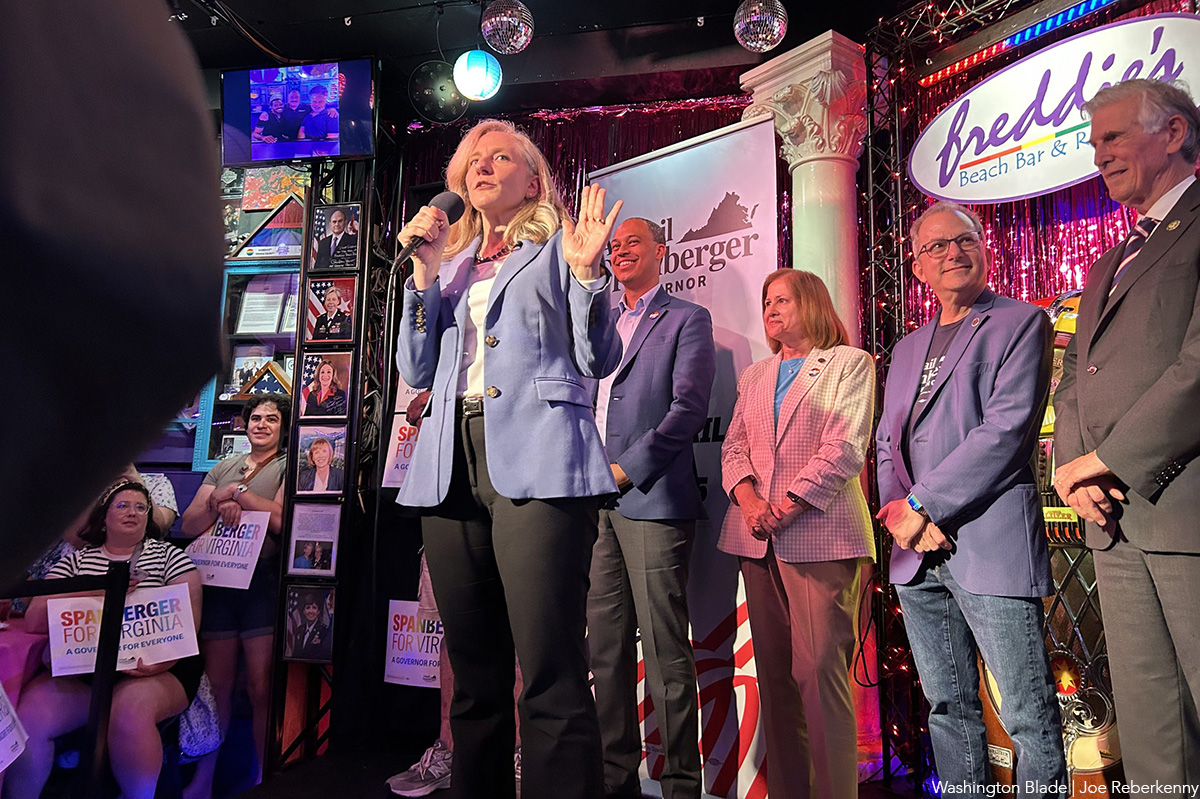
With the general election heating up and LGBTQ rights under increasing threat nationwide, Virginia gubernatorial candidate Abigail Spanberger brought her “Span Virginia Bus Tour” to Arlington’s Freddie’s Beach Bar for a campaign stop filled with cheers, policy pledges, and community spirit.
Spanberger, who served three terms in the U.S. House of Representatives from 2019 through early 2025 for Virginia’s 7th Congressional District, also served as a federal law enforcement officer specializing in narcotics and money laundering cases, and as a CIA case officer working on counterterrorism and nuclear counterproliferation.
Spanberger is running against Republican nominee Winsome Earle-Sears, the current lieutenant governor of Virginia, who said she was “morally opposed” to a bill protecting marriage equality in the commonwealth.
She was joined by other Democratic candidates and supporters: lieutenant gubernatorial candidate Ghazala Hashmi, attorney general candidate Jay Jones, Virginia state Sen. Adam Ebbin (D-Alexandria), and Congressman Don Beyer.
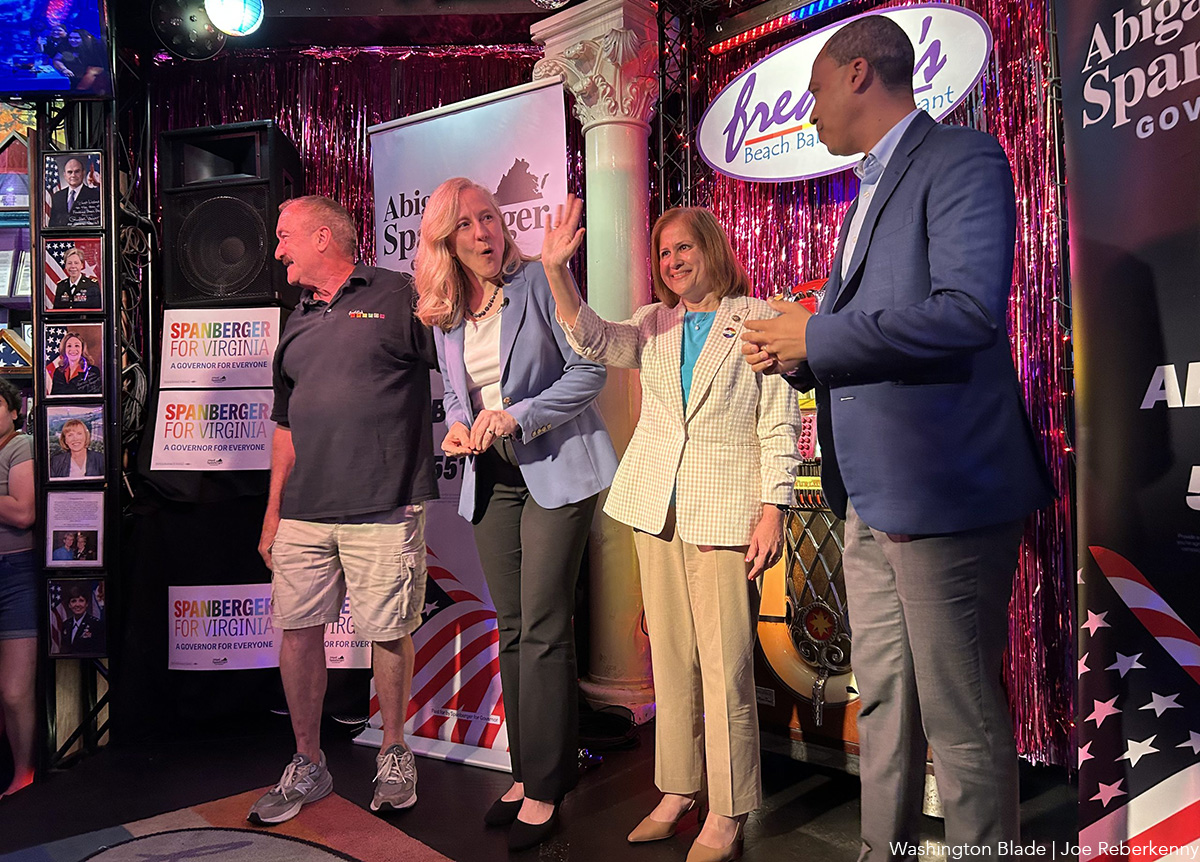
Freddie’s was packed wall-to-wall with supporters, many of whom wore “Spanberger for Virginia” shirts in the progressive Pride flag colors. In her speech, she made it clear that LGBTQ Virginians’ rights are on the ballot this year.
“I’m so excited to be here, and I am so grateful to the entire staff of Freddy’s for letting us overtake this incredible venue that is not just an awesome place to come together in community, but is a symbol to so many people of joy, of happiness, of community and of celebrating our friends and our neighbors,” Spanberger told the packed restaurant. “It is exciting to be here, and particularly during this Pride month, and particularly as we reflect on the 10-year anniversary of Obergefell and the reality that we still have so much work to do.”
“The reality is there are so many people who still would be inclined to take us backwards,” she said. “In this moment when we see attacks on people’s rights, on people’s humanity, on Virginia, on our economy, on research, on public education, on food security, on health care, on Virginians, on their jobs, on public service and on people — it can get heavy.”
“What it does for me is it makes me want to double down, because once upon a time, when I was talking to my mother about some horror show or sequence of activities coming out of a particular administration, she did not really have the patience to listen to me and said ‘Abigail, let your rage fuel you’ — and the conversation was over. And so I reflect on that, because, in fact, every day there is so much fuel to be had in this world and in this moment.”
One of the points Spanberger continued to emphasize was the importance of steadfast state government officials following the election of President Donald Trump, which has led to rollbacks of LGBTQ and bodily autonomy rights as a result of the conservative-majority U.S. Supreme Court.
“What the past few years have shown us is that a Supreme Court decision, no matter how many years we have celebrated its existence, does not protect us in the long term. And so as governor, I will work to make sure that every protection we can put in place for the dignity, the value, and the equal rights of all Virginians is a priority.”
During her speech, Spanberger highlighted several of the key values driving her campaign — protecting reproductive freedom and human rights, lowering healthcare costs, safeguarding Virginia’s environment, and ensuring that public education is affordable, accessible, and rooted in truth, not politics.
Spanberger went as far as to say that she wants to amend the state’s constitution to remove Section 15-A. “The reality is that in Virginia, we still have a ban in our state constitution on marriage equality. It is of the utmost urgency that we move forward with our constitutional amendment.”
“We will work to ensure that that terrible constitutional amendment, that was put in years ago, is taken out and updated and ensuring that Virginia is reflective in our most essential documents of who we are as a commonwealth, which is an accepting place that celebrates the vibrancy of every single person and recognizes that all Virginians have a place, both in that constitution and in law,” she added.
Following the event, two supporters spoke to the Washington Blade about why they had come out to support Spanberger.
“I came out because I needed to show support for this ticket, because it has been a particularly rough week, but a long few years for our rights in this country, in this state, with this governor, and it’s — we need to flip it around, because queer people need protection,” said Samantha Perez, who lives in Ballston. “Trans people need protection. Trans kids need protection. And it’s not gonna happen with who’s in Richmond right now, and we just need to get it turned around.”
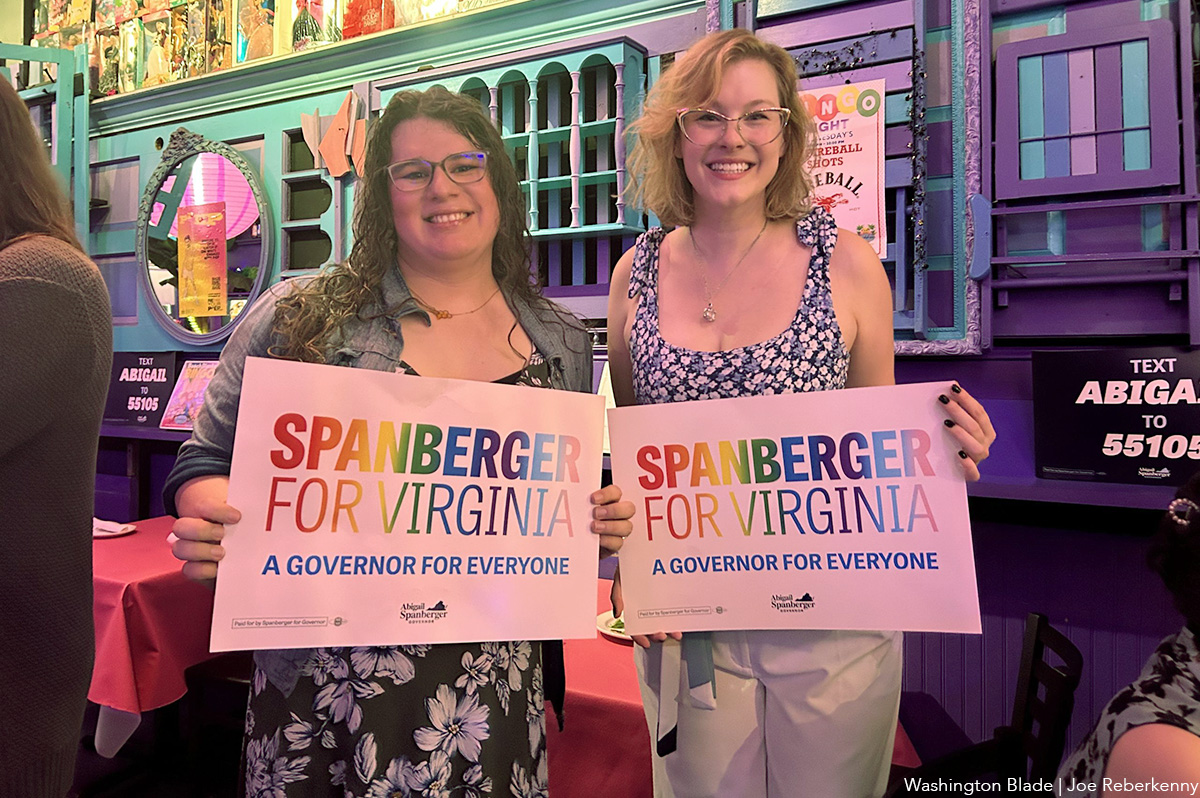
“The whole neighborhood’s here. All our friends are here,” said Annie Styles of Pentagon City. “It means the world to me to take care of each other. That’s what a good community does. That’s not what we’ve had with the Republicans here or across the nation for a really long time. It’s time to show that care. It’s time to make sure that good people are in a position to do good things.”
District of Columbia
Activists protest outside Hungarian Embassy in DC
Budapest Pride scheduled to take place Saturday, despite ban

More than two dozen activists gathered in front of the Hungarian Embassy in D.C. on Friday to protest the country’s ban on Budapest Pride and other LGBTQ-specific events.
Amnesty International USA Executive Director Paul O’Brien read a letter that Dávid Vig, executive director of Amnesty International Hungary, wrote.
“For 30 years Budapest Pride has been a celebration of hope, courage, and love,” said Vig in the letter that O’Brien read. “Each march through the streets of Budapest has been a powerful testament to the resilience of those who dare to demand equality, but a new law threatens to erase Pride and silence everyone who demands equal rights for LGBTI people.”
“The Hungarian government’s relentless campaign against LGBTI rights represents a worrying trend that can spread normalizing division and hatred,” added Vig. “Thank you for standing with us when we refuse to be intimidated.”
Council for Global Equality Chair Mark Bromley and two of his colleagues — Stephen Leonelli and Keifer Buckingham — also spoke. Health GAP Executive Director Asia Russell and Chloe Schwenke, a political appointee in the Obama-Biden administration who worked for the U.S. Agency for International Development, and Planned Parenthood staffers are among those who attended the protest.
(Washington Blade video by Michael K. Lavers)
Hungarian lawmakers in March passed a bill that bans Pride events and allow authorities to use facial recognition technology to identify those who participate in them. MPs in April amended the Hungarian constitution to ban public LGBTQ events.
Budapest Pride is scheduled to take place on Saturday, despite the ban. Hundreds of European lawmakers are expected to participate.
“Sending strength to the patriotic Hungarians marching tomorrow to advance human dignity and fundamental rights in a country they love,” said David Pressman, the gay former U.S. Ambassador to Hungary, on Friday on social media.
Sending strength to the patriotic Hungarians marching tomorrow to advance human dignity and fundamental rights in a country they love. Szabadság és szerelem. My past remarks on Budapest Pride: https://t.co/y1QhA9QouA
— David Pressman (@AmbPressman) June 27, 2025
-

 U.S. Supreme Court3 days ago
U.S. Supreme Court3 days agoSupreme Court upholds ACA rule that makes PrEP, other preventative care free
-

 U.S. Supreme Court3 days ago
U.S. Supreme Court3 days agoSupreme Court rules parents must have option to opt children out of LGBTQ-specific lessons
-

 India5 days ago
India5 days agoIndian court rules a transgender woman is a woman
-

 National4 days ago
National4 days agoEvan Wolfson on the 10-year legacy of marriage equality



